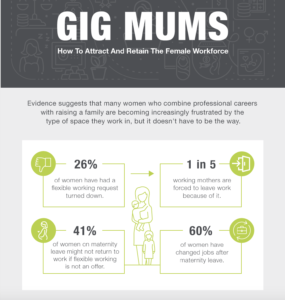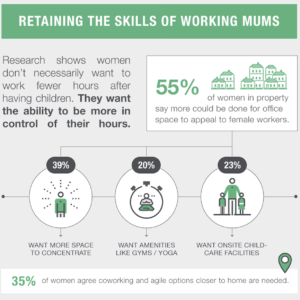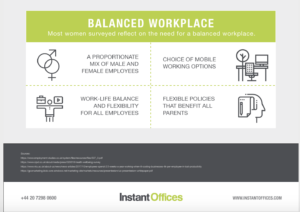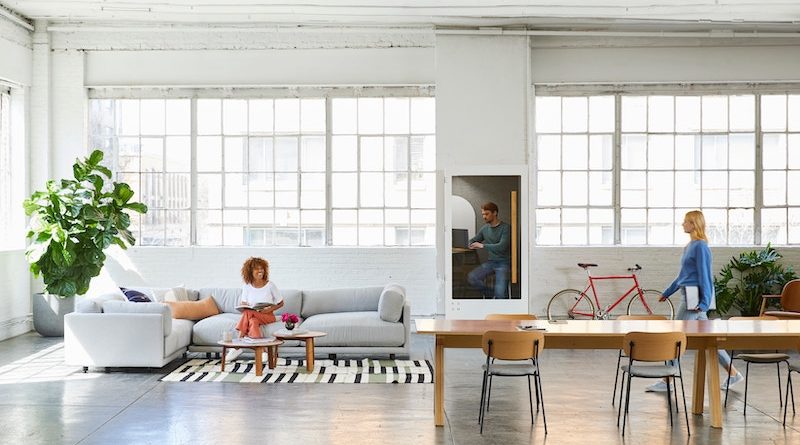Women are a key part of a growing contingent workforce of freelancers, consultants and part-timers. Despite numerous government policies to attract more mothers back into the workplace, retention is still a significant struggle. To find out why this is the case, John Williams, Head of Marketing at Instant Offices, explores how employers can tackle retention issues and attract workforce of mums.
Several data collected indicates working mums who return part-time, combining professional careers with raising a family, are increasingly frustrated by the type of space they work in. The research shows that the modern workplace often fails to cater for the needs of mothers and carers as they face the pressures of combining busy working lives with lifestyle and family obligations.
Blending lifestyle and work for working mums
 According to UniSpace, lifestyles and workplaces are blending together, as the working day demands more of our time and technology encourages an “always available” work culture. For mothers, in particular, Office designers have started to recognise the pressure to achieve a lifestyle and workplace balance – particularly for those who are in part-time roles and arguably have to juggle time more than ever before.
According to UniSpace, lifestyles and workplaces are blending together, as the working day demands more of our time and technology encourages an “always available” work culture. For mothers, in particular, Office designers have started to recognise the pressure to achieve a lifestyle and workplace balance – particularly for those who are in part-time roles and arguably have to juggle time more than ever before.
A survey of over 50,000 office occupiers showed that engagement in the workplace stays reasonably consistent between men and women of all groups, but it is the retention of female workers that drops, with 69% of people leaving being female (across all age brackets).
The WorkingMums.co.uk data shows that the number of female workers seeking part-time work, at all levels of the company, is increasing rapidly, but that the number of available opportunities is failing to increase at the same rate.
The survey shows that availability of flexible working is the key career development issue for working mums, with homeworking being valued highly, particularly for those wanting to work full-time. Other barriers included childcare costs – half of women currently on maternity leave said childcare costs could prevent them from returning to work.
The rise of female workspaces
 The growth of the contingent workforce has been one of the key drivers behind the move towards coworking. The rise of female-specific coworking spaces is a significant extension to this trend and highlights some of the limitations of conventional space for female workers.
The growth of the contingent workforce has been one of the key drivers behind the move towards coworking. The rise of female-specific coworking spaces is a significant extension to this trend and highlights some of the limitations of conventional space for female workers.
In the US, female-focused spaces are a growing niche but are also seen as a more adult departure from the “free beer and table tennis” culture that is viewed to be the domain of predominantly male technology startups. While this is a generalisation, it seems to have struck a chord, as female-only spaces are sold out and looking to expand.
Due to the lack of flexibility, the introduction of female only workspaces such as The Wing, a US based women-only workspace have been created to cater for busy mothers and women by featuring facilities from onsite creches, childminding to gyms, hairdressers and cafes.
While these spaces may initially be viewed as coworking spaces, their ultimate objective is to become networks that facilitate female entrepreneurship and support women at every stage of their journey.
Creating a balanced workplace
Following responses from a survey by Instant Offices, here are some tips that employers should consider in creating a balanced workplace for all employees:
- Flexible Policies that benefit all parents:Offering a number of ‘family days’ for both mum and dad to attend assemblies and doctor’s appointments, etc… would enable a fairer system for all involved.
- Choice of Mobile Working Options:Flexible working with multiple offices/sites and 4G connectivity would greatly help allow fully mobile working for parents who are on the go.
- Work-life by balance and flexibility for all employees:Providing company-sponsored childcare schemes that would include on-site childcare would improve quality and offer a more practical solution. This includes providing more private space to facilitate phone calls to carers, more flexible hours to work around pick up/drop off hours, and a change in working hours during long summer holidays.
Providing integration of workplace and lifestyle elements in the workplace helps to alleviate pressure on work/life balance – and brings to light recognition of the demands the working day places on them.
The Instant Group: Flexible Workspace Specialists
 Founded in 1999, The Instant Group is a workspace innovation company that rethinks workspace on behalf of its clients injecting flexibility, reducing cost and driving enterprise performance. Instant places more than 7,000 companies a year in flexible workspace such as serviced, managed or co-working offices including Sky, Network Rail, Capita, Serco, Teleperformance, Worldpay is making it the market leader in flexibleworkspace.
Founded in 1999, The Instant Group is a workspace innovation company that rethinks workspace on behalf of its clients injecting flexibility, reducing cost and driving enterprise performance. Instant places more than 7,000 companies a year in flexible workspace such as serviced, managed or co-working offices including Sky, Network Rail, Capita, Serco, Teleperformance, Worldpay is making it the market leader in flexibleworkspace.
Its listings’ platform Instant Offices hosts more than 12,000 flexible workspace centres across the world and is the only site of its kind to represent the global market, providing a service to FTSE 100, Fortune 500, and SME clients. With offices in London, Newcastle, Berlin, Haifa, Dallas, New York, Miami, San Francisco, Hong Kong, Sydney, Singapore, and Kuala Lumpur, The Instant Group employs 230 experts and has clients in more than 150 countries. It has recently been includedin the 2018 Sunday Times’ HSBC International Track 200.
Image Credit: ROOM on Unsplash
Infographic Credit: Instant Offices











